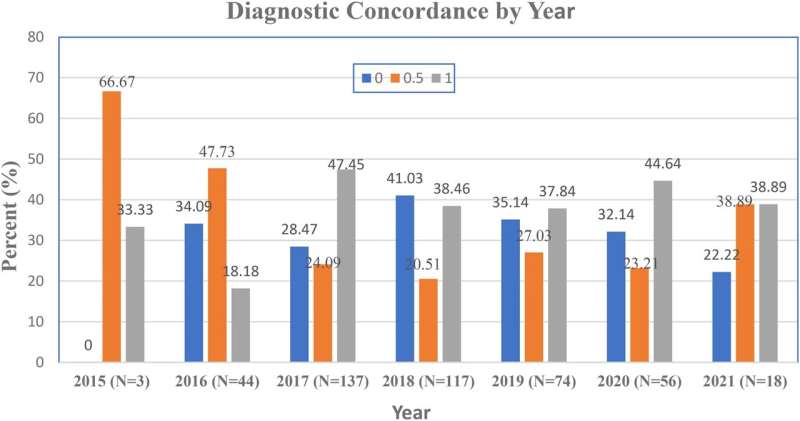This article has been reviewed according to Science X's editorial process and policies. Editors have highlighted the following attributes while ensuring the content's credibility:
fact-checked
trusted source
proofread
Dermatology program brings timely and accurate diagnosis of skin conditions to underserved communities

A dermatology program first developed by the University of Missouri in 2015 can bring life-saving diagnoses of skin conditions to communities without adequate dermatologic care. Researchers from the University of Missouri School of Medicine, looked at data collected as part of its Dermatology Extension for Community Health Outcomes (ECHO) project and found that primary care physician participation in the project improves accuracy and timeliness of dermatology diagnoses.
"Early and accurate diagnosis of skin cancer is critical to saving lives," said Mirna Becevic, Ph.D., assistant professor of telemedicine and lead evaluator for the Show-Me Dermatology ECHO project. "Access to dermatology remains a challenge for many patients, especially in rural areas, so it is essential that primary care physicians have access to tools to more accurately diagnose and treat dermatological conditions."
ECHO is an innovative educational and mentoring model where primary care providers and other clinicians connect with experts via videoconferencing. Physicians can bring de-identified patient cases to dermatology experts through the ECHO program for assistance in accurately diagnosing conditions.
The first Dermatology ECHO in the world was established at the University of Missouri and has since been implemented in seven countries.
Becevic's team looked at 524 de-identified patient cases brought to the Dermatology ECHO program since 2015 and found that less than 40% of primary care provider initial diagnoses were accurate, a third of patients were initially misdiagnosed by the primary care provider, and in only of 16% of cases did the dermatologic experts concur with the primary care physician's initial treatment plan. Through the Dermatology ECHO program, misdiagnoses are corrected, and proper treatments recommended.
These findings are similar to those from a 2019 study published in the Journal of Telemedicine and Telecare.
"Dermatology professionals need to be innovative and adaptive to expand access to life-saving treatment in underserved areas," said senior author Karen Edison, MD, senior medical director of the Missouri Telehealth Network, Show-Me ECHO and the Center for Health Policy. "Dermatology ECHO provides expert care at the right time and place for more patients. We hope our findings encourage more widespread adoption of and participation in innovative strategies, including ECHO and tele-dermatology, which remain underutilized."
The research is published in the Journal of Telemedicine and Telecare.
More information: Mirna Becevic et al, Diagnostic and treatment concordance in primary care participants and dermatologists utilizing Extension for Community Health Outcomes (ECHO), Journal of Telemedicine and Telecare (2023). DOI: 10.1177/1357633X221147074
Catherine Bridges et al, Utility of Dermatology Extension for Community Healthcare Outcomes (ECHO) sessions in the adult and paediatric population, Journal of Telemedicine and Telecare (2019). DOI: 10.1177/1357633X19874200


















